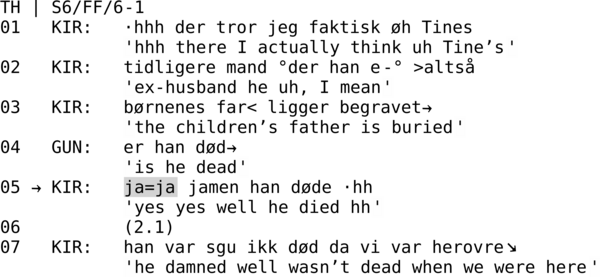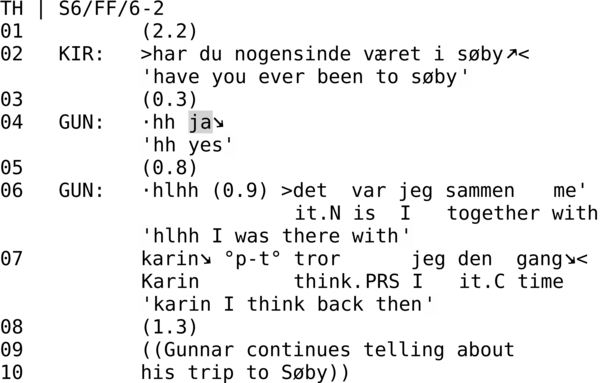Ja + expansion as response to yes/no questions
Questions which are asked as yes/no questions sometimes require more than just ja ‘yes’-response. The following is an example of that. Kirsten (KIR) has told about a trip she has taken with a friend (Tine), to a place where Tine’s ex-husband and mother-in-law are from. At the start of the excerpt Kirsten has just mentioned the name of the place they visited.

Lines 1-3 reveal that the speaker’s friend’s ex-husband is buried in the place they visited. Line 4 shows that the recipient Gunnar (GUN) didn’t know he was dead. He then asks the question er han død→ ‘is he dead’ which immediately calls for confirmation. It may seem odd to ask for confirmation that a person is dead, when you’ve just learned they are buried. However, Gunnar’s question shows that the information about the man’s death stands in contrast to what Gunnar thought he knew. In a context where an asker shows that a piece of information contrasts with their previous knowledge, a yes/no question will be treated as a request for confirmation plus an expansion relating to the missing information. This is what Kirsten does in lines 5-7 where she initially confirms and then proceeds to addressing the reason why Gunnar might not have known about the husband’s death.
Yes/no questions can also request more than merely confirmation in situations where the question indicates that one could – and should – elaborate on something. Here is an example of this, also from the conversation between Kirsten and Gunnar.

Earlier in the conversation Kirsten and Gunnar had been talking about Søby, and so by asking Gunnar if he’s been there, Kirsten brings the topic up again. Additionally, she directly addresses Gunnar’s presence in the town, that is, his experience of having been there. So, although the question superficially seems to call for a confirmation with just ja ‘yes’, this wouldn’t be enough because it doesn’t elaborate on the experience.
Questions posed as yes/no questions and which occur in situations where it becomes clear that the asker lacks knowledge (aside from merely getting confirmation of the question’s premise), call for more than just a confirmation.
Sources and further readings
Steensig (2015) is a review of different situations in Danish conversations where questions and other utterances call for either ja ‘yes’ or more than ja ‘yes’.
Steensig & Heinemann (2013) is a more solid study of yes/no questions which call for more than ja ‘yes’. This is the main source for this entry, and all the examples used here come from this article.
Indgange
The Building Blocks of Talk-in-interaction > Word Classes/Parts of Speech > Interjections and particles
Social Actions > Questions > Request for confirmation
